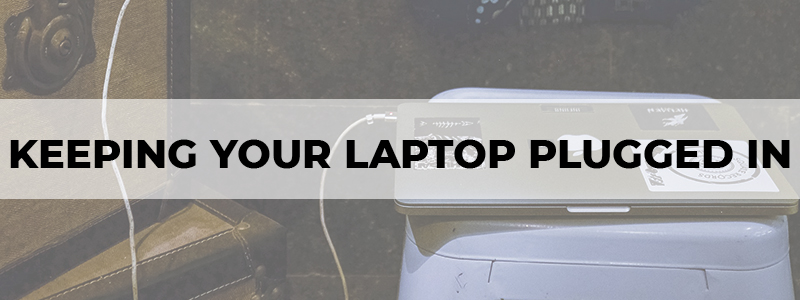
A laptop’s allure stems from its portability and ease, making it the number one choice for many professionals. However, laptops are only as good as their batteries, and taking proper care of your battery will ensure that it lasts a long time and keeps its charge.
A failing battery might make what would otherwise be an excellent laptop unworkable. This is a frequent issue among laptop users, and there are a variety of solutions available.
If you want to get the most out of your device battery, simply be cautious about whatever recommendations you choose. Most laptop users, especially gamers, want the best performance possible to enhance their gaming experience.
It is just not entirely true that keeping a laptop plugged in for an extended period of time would harm it. Still, other variables, such as heat, should be avoided to avoid battery damage.
All laptop users, at some point or another, consider the same doubt: is it bad to keep your laptop plugged in?
Let’s find out!
Keeping Laptop Plugged In
Lithium-ion and lithium-polymer batteries are the two most common types of laptop batteries. Despite the fact that they are two separate technologies, they both generate power through the flow of electrons. This continuous flow is also required to keep the battery in good condition.
The following assertions are valid for both types of batteries, at least in terms of contemporary laptops.
- It is impossible to overcharge a battery. If you leave a battery plugged in all the time, there’s little risk of it overcharging. It will stop charging as soon as it reaches 100% and will not restart until the voltage falls below a specific threshold.
- A battery will be damaged if it is fully discharged. Allowing the battery to run dry for a lengthy amount of time might cause it to go into a deep discharge phase.
It’s possible that you’ll never be able to charge it again as a result of this. There are several methods to jump-start a dead laptop battery.
So, do we infer that you should leave your laptop plugged in all the time as a result of this? That’s not the case.
Batteries for Laptops
Lithium-ion batteries, as previously mentioned, are used in the majority of devices. Lithium-ion batteries, unlike nickel-based batteries, do not have a “memory effect,” which means that discharging and recharging will eventually affect the battery’s long-term life.
Because your battery will simply stop charging once it reaches full capacity, leaving your laptop plugged in will not harm your battery.
It is preferable to avoid entirely discharging lithium-ion batteries before recharging them to full capacity. It is known as “deep cycling,” and it is only helpful for nickel-cadmium and nickel-metal hydride batteries.
You should, however, do a deep cycle once or twice a month to re-calibrate the battery. This permits the battery monitoring mechanism to display battery life and charge with accuracy.
Heat Can Damage The Battery
While having your laptop plugged in all the time isn’t harmful to its health, too much heat can destroy a battery over time.
Keep in mind that the high temperatures aren’t only due to the climate.
When you use processor-intensive apps like games or when you have many programmes open at the same time, you will generate more heat.
If your computer becomes too hot when plugged in, remove the battery and store it somewhere cold to avoid heat damage (obviously it will not be possible in most cases. However, this is the best way to conserve the battery health if it is important to you).
Is It Necessary to Remove the Battery?
If heat is a risk, it poses the apparent argument. When running your laptop on AC power, should you remove the battery entirely?
Obviously, with the huge increase in the number of laptops with sealed batteries, this isn’t practical.
When it comes to whether or not they can be replaced, the answer appears to differ from one manufacturer to the next.
According to Acer, you don’t need to remove the battery when using AC power, but you should do so if you won’t be using it for many days. When Apple first released laptops with detachable batteries, it urged users not to remove them.
It all ultimately comes down to the device’s power control configuration. When a battery isn’t there, some may limit the power exactly as they do when low battery level. It’s possible that you’ll end up with poor performance as a result of this.
If you do decide to remove the battery, make sure you safely store it. This generally entails a charge of 40 to 80 percent and storage at room temperature.
Battery Care
Battery care for laptops or any other device remains essential for its performance and longevity.
While doing a deep cycle, charge your battery to maximum capacity and then let it rest for two hours to cool down after charging.
Once your battery hits 5%, unplug your power cable and set your computer’s power savings settings to hibernation.
When your computer goes into hibernation, wait around five hours before plugging in the power line and letting it charge to full capacity again.
Conclusion
While keeping your laptop plugged in will not harm it in the short term, the battery’s capacity will most likely be depleted in the long run due to factors such as heat. That is, if you solely use it on AC power.
Similarly, suppose you use it on battery power. In that case, you’ll get through the discharge cycles of the battery a lot faster than they should. Meaning the reduction in battery life. That’s not ideal either.
As a result, the best option is a hybrid of the two: operate it on battery power on specific days and keep it plugged in on others. And whatever you choose, keep in mind that it shouldn’t get too hot.
